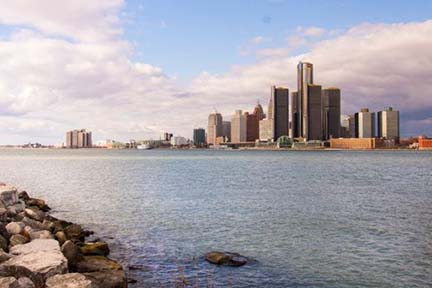
Tips for identifying and avoiding harmful algal blooms
Press Release FOR IMMEDIATE RELEASE: July 27, 2021 CONTACT: Stay safe this summer: tips for identifying and avoiding harmful algal blooms LANSING, Mich. – If you or your family are living near or visiting Michigan waters in summer or fall months it is important to be aware of the potential for harmful algal blooms (HABs). HABs form due to a rapid overgrowth or bloom of cyanobacteria, also known as blue-green algae. Cyanobacteria are naturally present in lakes, rivers and ponds. Unfortunately, some cyanobacteria produce toxins, called cyanotoxins, that can be present in cyanobacterial blooms, which at higher levels can be harmful to people and animals. HABs usually occur in Michigan May through October, most commonly in August and September. The occurrence of cyanobacteria and their toxins has been confirmed in lakes across Michigan in previous years, and elevated toxin levels have been documented in a small percentage of Michigan lakes. During 2020, 61 HABs in 35 Michigan counties were reported to the Michigan Department of Environment, Great Lakes, and Energy (EGLE) “Before going in the water, we recommend Michiganders look for visible algal blooms or scums on any lake, and that people and pets stay out of water in areas that look affected,” said Dr. Joneigh Khaldun, chief medical executive and chief deputy for health for Michigan Department of Health and Human Services. “If you may have had contact with or swallowed water with a HAB and feel sick, call your doctor or Poison Control at 800-222-1222. If symptoms are severe, seek emergency medical attention as soon as possible.” What does a HAB look like? HABs can look like algal scums or mats, spilled paint or pea soup, or colored streaks on the water’s surface. Visit the HAB Picture Guide for examples of HABs and other algae and plants. Blooms may last for days or sometimes weeks. Blooms can change in size, toxicity and location within the same day. They also may disappear on a waterbody, but then form at a later time. What should people do if they think they have found a HAB? Consult the HAB Picture Guide for examples of HABs and compare your sighting to other algae and plants found in lakes. If you suspect you have found a HAB or have any suspicion:
What are the symptoms of HAB exposure? Breathing in or swallowing water containing HABs and their toxins may cause the following symptoms: runny eyes or nose, asthma-like symptoms, stomach pain, vomiting, diarrhea, weakness, numbness, headaches, dizziness or difficulty breathing. Skin contact can cause rashes, blisters and hives. Should residents be concerned about threats to animal health? Animals, especially dogs, can become ill or die after contact with HABs. Signs of illness can include vomiting, diarrhea, staggered walking and convulsions. Preventative measures for dogs include keeping them out of the water wherever surface scums or discolored water are visible, bringing along clean, fresh water for them to drink and rinsing them off after contact with any lake water. If a pet or livestock animal becomes sick after contact with water that may have a HAB, contact a veterinarian right away. Illness in an animal due to exposure to a HAB is reportable to the Michigan Department of Agriculture and Rural Development (MDARD). Cases can be reported by submitting a Reportable Disease Form, located at Michigan.gov/dvmresources under “Reportable Diseases,” or by calling 800-292-3939 Monday through Friday 8 a.m. to 5 p.m. What can people do to help prevent HABs from occurring? Michigan residents should learn about nutrient pollution, such as excess nitrogen and phosphorus, to reduce and prevent HABs. Excess nutrients may come from detergents, sewers, fertilizers and malfunctioned septic systems. Michiganders can decrease nutrients getting into the water by:
Contacts for HAB questions
|







